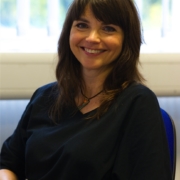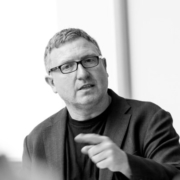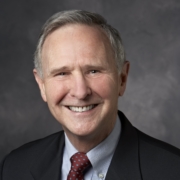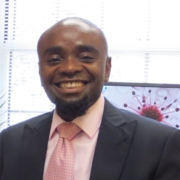Mmantsetsa Marope
Education Development and the Future of Curriculum
In our fast-changing world, how should we think about the curriculum? For what macro competencies should education aim? And has the COVID-19 pandemic revealed any failures in our education systems worldwide? These are difficult questions to answer and dependent on context. To help make sense of these questions, UNESCO’s International Bureau of Education has recently published a set of normative documents to help guide the future of curriculum in the 21st Century.
Today Dr. Mmantsetsa Marope, the Director of the International Bureau of Education, joins me to talk about a competence-based curriculum that can support the attainment of the Education 2030 agenda. Dr. Marope has extensive experience in education, including 11 years as a university professor, 10 years at the World Bank, and 11 years in the United Nations.
Citation: Marope, Mmantsetsa, interview with Will Brehm, FreshEd, 204, podcast audio, June 29, 2020. https://freshedpodcast.com/mmantsetsamarope/
Will Brehm 1:19
Mmantsetsa Marope, welcome to FreshEd.
Mmantsetsa Marope 1:22
Thanks, Dr. Brehm. Thanks for having me.
Will Brehm 1:26
So, I want to talk today a little bit about curriculum and development and you’ve been involved in different aspects of education for quite some time and at many different levels. So, how would you conceptualize the very idea of development?
Mmantsetsa Marope 1:42
Before we get to the core of that question, let me just say, you know the term development can be used in general, colloquial, conversational terms. It just means change. For instance, if journalists were monitoring a situation unfolding, they could what ask one another, “Has there been any development?”, meaning has the situation changed. And the change could be for the better or for the worse. So, development in and of itself is just a neutral term meaning change. In the US, for instance, development can be also used to mean a change in a local context. Like for instance, if you have a mall coming up, or a new neighborhood, often it’s not uncommon for them to refer to it as a development and the people involved as developers. If authors were discussing a story, they could talk about the development of the story just meaning how it unfolds. So, in the just general conversation, but then more towards the technical end, development is used to refer to very specific aspects of life like economic development, a child’s development, stages of development. We have, for instance, very established instruments, like the World Development Report, the Human Development Report, etc. So, when you get technical with that word, you’d see that many things developed. It could be a child, it could be a city, it can be a person, it could be the world, it can be a human being, and so on and so forth. So, I just want to say that our chat, if I may just call it a chat, which is indeed what it is, is about development in technical terms. And I prefer to, I conceptualize development as the constant and sustainable advancement, or growth, of an entity – an individual, a collective, a nation or the world- that translates into a better or more desirable state of being, and a better enjoyment of a better quality of life, and ultimately fulfillment. So, in this technical perspective, development necessarily takes a positive tone, in the sense that it culminates in a better state of being in a higher enjoyment of life, in a better quality of life, and in fulfillment.
Will Brehm 4:38
So, organizations like UNESCO, or the World Bank, working in international development -and specifically in our field, international development and education- the idea is that these organizations and institutions are working in a sort of technical way to -at least in your conceptualization- have constant growth towards some desirable outcome or life as it’s so desired.
Mmantsetsa Marope 5:10
Exactly. I mean, for UNESCO for instance, the ultimate goal of UNESCO is to promote peace and collaboration among nations. For the World Bank, I would hazard a guess and say that the World Bank works towards a better shared economic prosperity and quality of life. And depending on different presidents, when I was still at the Bank, the Bank was really focused heavily on the elimination of poverty and inequality across life. So, they all work towards a better state of being and the upliftment of people. And if I can go on is that such development from this technical perspective to me, development has multiple enablers. For instance, economic growth. Economic growth enables us to afford a better state of being. But that growth has to be shared growth. And that is why there is a reference of shared growth, of growth with equity. A second important enabler is social cohesion and stability. You can’t have development in a state of perpetual social fracture and instability. But that social cohesion necessarily has to be underpinned by respect and value for diversity. An appreciation and almost a celebration of diversity that perceives diversity as an asset and not a complexity that has to be tolerated or coped with. So, this is a very important enabler. The third enabler is political stability but that political stability which is underpinned by political pluralism. So, as just as social diversity, that political plurality perceived as an enrichment of the political dialogue that leads to higher levels of checks and balances of power, higher levels of democracy, and higher level of recognition of every political perspective as a worthy perspective that brings value to the table and that improves the governance of a particular country or society. Also important is respect for human rights, human freedoms, justice for all, and we have other elements of enablers like technological advancement. Today particularly, it’s difficult to imagine as talking about development without including in it a technological advancement. But to all these elements that – whether it is social stability, shared economic growth, political stability, technological advancement, human rights, you know health services and stuff- is education is extremely important that education is one of the enablers of development. Equal opportunity to high quality and relevant education for all is important. Not just as a right in itself, but because education enables other enablers. For instance, we need educated people with appropriate competencies to boost productivity, which is the basis for growth. We need people who are socially astute and educated, who understand human values, who understand issues around diversities, who can work towards social stability, social cohesion. All these enablers are driven by people but not just human beings, but well prepared competent human resources. So, education becomes a very core enabler in its own right. An enabler of development but also an enabler of other enablers. And that’s why it is extremely rare to find any document that talks about development that does not underscore the importance of education.
Will Brehm 9:53
And so, one of the big features of education that we can think about, when we are trying to figure out ways in which education can actually be that enabler of both development and other enablers, is the curriculum. So, in your work and in your conceptualization, how do we connect development and the curriculum?
Mmantsetsa Marope 10:18
If I can go back to the to the point I was making, that it is very rare to find any document that talks about development without mentioning education. There is just a taken for granted understanding that education is very pivotal to development. But what we actually mean is that education produces people with competencies that we need to drive that development. Whether that competence is multiculturalism and cultural understanding, whether that competence is technology savvy that allows somebody to work in a particular environment, whether that competence is a “green skill” and so on. The curriculum, on the other hand, is the concrete operational tool in an education system that societies use to collectively decide what is important for people to know and to know how to apply it. So, the curriculum is that tool through which societies define competencies that they need in order to build a threshold of human resources required to drive development. Otherwise, we just have inspirational statements about the importance of education in development. But we need to go below the aspirational and inspirational statements to see how -and the curriculum is the how. Because that’s, as I said, where we very carefully define those competencies that people must develop if they are to drive development.
Will Brehm 12:08
So, one of the conundrums then is, if we take the word development to mean change, there’s obviously a lot of change in development over time, in any society, and probably at any time. And perhaps our current time, the 21st century, things are changing – you know we might be able to quantify that things are changing a bit more rapidly than before, but it does not really matter. I mean, there’s massive social change over time. And so, then that question becomes, you know, are competencies constantly changing that need to be found within the curriculum or are there some competencies that are say stable or universal across time?
Mmantsetsa Marope 12:53
Yes, it is a conundrum indeed, because by saying that the curriculum is that concrete instrument for defining relevant competences. It’s equal to saying whenever we say an education system is relevant or irrelevant, what we really mean is that it graduates people without competences that society expected from them. But as you said, that development context of that very society changes very fast. So, the challenge is how do we sustain development relevance of education, through the curriculum in fast-changing contexts? And your question as to whether they are more stable in the foreseeable future as much as we can see competencies. And my answer would be yes. When we talk about relevance, we have to see relevance -or at least I see relevance as two sides of a coin. The one side is responsiveness. That this education system through its curriculum, it responds to contextual changes. And as you say, this can be very rapid, disruptive, unpredictable changes. But the other side of the coin is proactiveness, where we said but what is the core business of education? What should education produce? Supposing we could hold the context still, but we still have education systems running, what exactly would those education systems be doing? And this is important to look at education’s own core business as the steady thread that holds the curriculum stable for some foreseeable future and the responsive side as that boiling pot where you know, COVID-19 outbreak, we very quickly go into both the formal and informal curriculum and quickly say what should people learn in order to protect themselves from COVID-19. Now, the stable competencies in our view a couple of years ago, three years -time flies- we had a very long consultative process of trying to distill what could these core competencies be. And we named them the macro-competences, and we see them as stable competences. And the first one is knowing how to learn. And because in a rapidly changing context, what you learn, the what, can become obsolete very quickly. But if you know how to learn when the context throws new challenges and new opportunities to you, you will learn anew. So, this is the first competence that we think is stable. I don’t believe there will ever come a time when we can debate and say, “No, we don’t need to know how to learn anymore”. And because knowing how to learn is really the most robust source of human adaptability, agility to adopt, and resilience. But it is not just for humans, it is also for entities is that a business does not learn if a society does not led, a political party doesn’t learn, anything doesn’t learn, it’ll become obsolete. So, that’s the first stable competence. The second one is self-agency. And we see self-agency as teaching people to perceive themselves as self-benefiting agents. That they are responsible for their individual good and that they have to take responsibility and be self-benefiting. And they can act on their own behalf for their own good. They don’t have to wait for things to happen to them or for something else or someone else to do it for them. This is named in different ways at the micro-level of competencies like drive, motivation, endurance, grit, and responsibility and so on and so forth. The third one is interactively using diverse resources. At any point in time when you are seeking to act on your own behalf, you have multiple resources at your disposal. Time is a resource, technology, people around you, the expertise, wisdom around you and so on. And are you able to harness these multiple resources around you to have a positive impact on your own life and to use these resources efficiently. And efficient use of resources is important because it’s part of the building blocks of sustainable lifestyles and responsible consumption. To know that, yes, I may have resources around me, but I have to use them efficiently and responsibly. And this is extremely important for any global citizen to recognize this. The fourth competence, I believe, is interacting with others. Yes, you are a self-benefiting agent. But no one person is sufficiently intelligent, wise, experienced, to be able to depend solely on themselves. And at any one point when there is an opportunity in life, or your context presents a challenge to you, you may use your own resources, but you often have to reach out to others to work with them. When you start reaching out to others, you become a self-benefitting agent because you have a self-interest in there. But you also become a benefactor because you now start acting on behalf of other people’s interest. And the same applies to them. They act in your interest and in their interest. This interacting with others for a positive impact also comes in many languages, teamwork, collaboration, negotiations, partnerships, and so on. But this is a very enduring competence. Do people know how to interact with each other? And I’m sure we’ll come back to this competence later. And the fifth competence is interacting in and with the world, interacting with the world is a bilateral transaction. You know, I need Dr. Brehm, he needs me, and I can work across the world with you. But interacting in the world means I’m taking some space in your world, you are taking some space in my world, and owning it so you become a world player. We talk so much of world thought leaders, world players, people at the center stage of the world. These are people who are interacting in and with the world. They are not just interacting from their standpoint with the world, but they are integral inside the world. And it’s also the bare basics of being “glocal” and global. That you are able to balance the ability to act at different levels of the world that you live in. And this is quite important in our world as we as we know it now. It means also being able to balance your rights with other people’s rights. To balance privileges with responsibilities. To respect freedoms, but balancing freedoms with rights because you are interacting with the world and in the world. You are not just a self-benefiting agent, or a small team interacting with others. Your sphere of influence is much bigger and therefore, you have to have several considerations as you interact. The sixth one is multidisciplinarity and transdisciplinarity. Because a lot of times when you talk about competencies, people quickly think it means the old disciplines are out of fashion. And when I think about competencies don’t develop in a vacuum. Competence is actually being able to harness knowledge, skills, values, dispositions, tech savvy and others to use them interactively to bring to bear a desired result. So, a competence-based approach to education demands very deep understanding of disciplines because it goes beyond just knowing the content and regurgitating it, but how to apply those disciplines transdisciplinarily, in order to bear results. And that’s because life challenges and opportunities do not come in smart packages of disciplines. You do not get a physics problem or a math problem except in your classroom, of course. You get a problem that demands your knowledge of multiple disciplines at any point in time. So, while all of us have to be deep specialists in our areas, we also have to have a fairly decent threshold of mastery of other disciplines enough to know when you are out of depth and I know now, I need to reach out and now go back to interacting with others because now I need Dr. Brehm here. It’s not my forte, but I need that augmentation. And the last competence is multiliterateness. You know, when we grew up maybe the three R’s, cut it but they don’t cut it anymore. We’ve added digital literacy, financial literacy, health literacy, cultural literacy, the list goes on. But at any point in time, when you are in a context, some form of literacy is called on more than the other. So, if I were in a multicultural context, I would be using different literacy more heavily than if I were in my little village in a small, near uniform context if there could be ever something like that. Now, if you look at these seven macro-competencies, we believe they really do endure. And they can be the bigger why of education, we need to produce people who know how to learn. We need to produce people who are self-benefiting agents, who can work in teams, who can use resources responsibly, who are multiliterate, who are transdisciplinarians, and so on and so forth. But then around these macro-competencies, we then have the ability to respond to contextual challenges as they rise. So, at the end, a good curriculum design has to balance stability with agility because if all we are doing is responding all the time, and you see this a lot in countries, what we might get into is a curricula where we are always reforming reforms. And before the previous reform could take root -and it takes time for teachers particularly and learners and parents to settle into a new reform to own it, to support and implement it- and before they can catch a hold of it, there’s another reform and another and another. So, that delicate balance needs to be struck.
Will Brehm 25:21
Do you think that balance was reached during this pandemic? The most recent pandemic of COVID-19. Has this global pandemic revealed any particular strengths or weaknesses in these sorts of seven macro-competencies?
Mmantsetsa Marope 25:39
I think the one weakness that it revealed, a very stark weakness, is our feeble effort as the global education community at producing lifelong learners, at producing learners who know how to learn. Suddenly schools were closed. There were no more teachers in front of learners, at least physically, and we then went into this slogan “interrupted classes, uninterrupted learning”. But could we really swear and say that we knew that learning was not interrupted? I don’t believe so. And if you look at what is the proportion of the world’s children that we can safely say they have the competence of knowing how to learn. It’s clearly very small because the evidence we have now, before COVID-19, we already had the “global learning crisis” where close to two thirds of the 617 million learners in general education, two thirds of them do not acquire basic reading, basic numeracy efficiency. If you cannot read with understanding, the rest is just talk. You can’t tell me that a child, who already had difficulties understanding what the text they read, can go home and sit in front of a computer, some of them no computer, listen to a radio with very bad frequency that they are effectively learning because they know how to learn. So, I think if there is an urgent competence that really came out is needing serious intensive curve. It is not just focusing on what people must learn, but on how they must learn, and in their own understanding of how they learn. I think that’s a stark weakness. The second weakness which applies more generally to education in general than just to curriculum is the inequality of resources. I said one of the competencies is knowing how to use multiple resources interactively to bear desired results. But you can’t know how to use resources if you don’t have them. And then suddenly, we had all these regions of the world where we assumed we can have uninterrupted distance learning but then these kids don’t have the basic things just like those very radios we are talking about, don’t even go to connectivity and technological devices that they needed. So, the inequality in resource provision that should enable effective teaching and learning environment were shown very nakedly by COVID-19. And I don’t quite know how quickly this situation can be remedied, but it certainly is an issue. The third weakness is self-agency because self-agency means also self-management because the learners have to go into self-directed learning. And parents had to step in and do facilitate homeschooling. Teachers who weren’t necessarily ready to present their materials to learners as a distance, be it digitally or otherwise, were suddenly also flung into their areas of incompetence. So, this is again an area where, are we teaching learners to take charge for their own learning? Or are we teaching them that there will always be someone in the form of a teacher, a parent, a something to help you learn? And I think this is one of the another area that we really need to work on that COVID-19 showed us off in.
Will Brehm 30:02
It is really quite fascinating. I mean, some of these sort of different priorities that education systems have and some of the, I guess we could say, inequalities in the inputs to education that, as you said, the pandemic has really sort of laid bare and could potentially result in sort of an inequality in how these different macro-competencies are distributed worldwide, depending on context. So, it’s really quite a fascinating insight that the crisis has revealed. And like you said, I also don’t know the way forward or the correct answer other than these different inequalities need to be explored in much more depth and I guess, governments, citizens, school leaders have to be involved in a conversation as to how to rectify some of these inequalities. I’m not sure what do you think?
Mmantsetsa Marope 30:53
I think that we need we need an open dialogue. Now the tricky part of this open dialogue is invariably those who are under resourced are also not able to join into the dialogue because the dialogue is conducted in a manner, and language, and culture that excludes them. For instance, if I can just quickly use Africa, for instance, a good amount of dialogue on education or development in general in Africa is conducted in foreign languages. So, before we can even get to, “Do we understand the concepts and do we mean the same things?”, it’s just, “Can I hear what you’re saying?” So, who’s talking to parents and communities in their own native languages about the deep issues we are discussing now? You know, who’s talking to parents about the importance of having electricity in their home if their kids have to always have some device that has to be charged. And even if you talk to them, who is enabling them to afford that electricity? Going back to economic growth, as shared growth if we are serious about development. So, I think at least COVID-19 will force our hand at starting this dialogue. But the biggest challenge to me is how broad based and broadly owned this dialogue can be because everybody can understand any concept if you deliver it in their language. And if you demystify it, and none of anything we have said is mysterious to anybody, anybody. You don’t have to sit one minute with a parent to explain to them that the education of their child is important. No parent at all. But what they may not understand is what are all the facilitators and enablers they must have, in order for their children to have an enabling learning environment. And even if they understood the second challenge, which is even more systemic because this now goes to global and national structural inequalities. Even if they understood, do they have the means to afford those enablers? So, the problem is by no means a quick turn. And there’s talk of the, you know, quick lending facilities, for instance, by the World Bank, there’s talk of donors putting more funding into education and so on. But I think the challenge is deeply systemic and it’ll require maybe much longer than we are willing to admit to unroot these structural inequalities that then translate into different home learning environments for different people and different children.
Will Brehm 34:15
Well, Mmantsetsa Marope, thank you so much for joining FreshEd. Really a fascinating conversation on the future of curriculum.
Mmantsetsa Marope 34:22
Thank you very, very much. And thanks for having me. It was a pleasure chatting with you.
Want to help translate this show? Please contact info@freshedpodcast.com
Related Publications by Guest
Reconceptualizing and repositioning curriculum in the 21st century
Mentioned Resources
Other Related resources
Education and National Development: A Comparative Analysis
Knowing how to learn is key in the information age
Education During COVID-19 and Beyond
Learning in the time of COVID-19
Multimedia Resources
Why is lifelong learning needed
How can we make changes towards lifelong learning
Have any useful resources related to this show? Please send them to info@freshedpodcast.com









